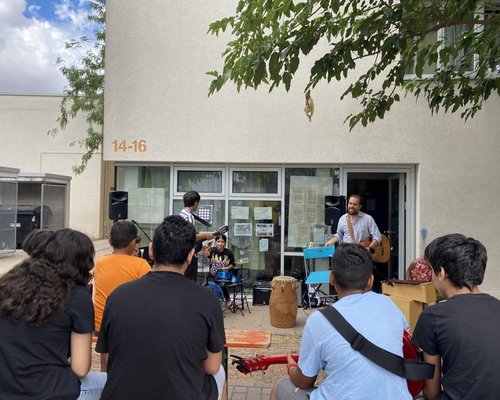
Promoting Cultural Participation and Social Inclusion through Music Therapy at SRH University Heidelberg
In recent years, the integration of young refugees into host societies has become a vital social goal across Europe. Recognizing the power of cultural engagement, SRH University Heidelberg has launched an innovative project named “Bridges”, aimed at fostering social inclusion, mental well-being, and intercultural exchange through music. This initiative demonstrates how academic expertise in music therapy and education can contribute significantly to refugee integration efforts, creating meaningful community connections and empowering young individuals to share their cultural identities.
Understanding the ‘Bridges’ Project: Objectives and Key Components
The “Bridges” project, managed by SRH University Heidelberg since January 2025, is financed by the European Union’s Asylum, Migration and Integration Fund (AMIF) with nearly 670,000 euros over three years. Its core mission is to use music as a tool for social participation, emotional expression, and skill development among refugee children, adolescents, and young adults living in Heidelberg.
Under the scientific guidance of Professor Dr. Alexander F. Wormit, renowned for his expertise in music therapy and education, the project aims to facilitate intercultural dialogue and mutual understanding. Collaborating with local organizations and community partners such as Verein für Interkulturelle Musik Metropolregion e.V., Heidelberg’s social services, and cultural centers like Karlstorbahnhof e.V., the initiative creates a platform for refugees to express themselves through music, both individually and in groups.
The Role of Music Therapy in Refugee Support and Integration
Music therapy is increasingly recognized for its ability to address mental health challenges, especially among populations exposed to trauma and displacement. The “Bridges” project employs tailored music therapy sessions to help refugees process emotional stress, build resilience, and develop social skills. Music provides a universal language that transcends linguistic barriers, making it an effective medium for healing and self-expression.
SRH University Heidelberg’s expertise in this field ensures that therapeutic practices are culturally sensitive and adapted to the diverse backgrounds of participants. Using instruments, singing, and improvisation, young refugees are empowered to re-establish a sense of agency, confidence, and belonging—key factors in their social integration journey.
Music Education and Cultural Expression: Creating Intercultural Spaces
Beyond therapy, the project emphasizes music education as a means of fostering intercultural dialogue. Weekly “Spielraum Musik” sessions in refugee centers invite participants to sing songs from their native countries as well as popular hits, facilitating both cultural exchange and personal identity reinforcement.
Part of the program includes individual music lessons and band workshops where young refugees hone their musical skills, collaborate with peers, and express their stories through creative projects. These activities not only improve musical proficiency but also serve as social conduits, breaking down cultural barriers and building community ties.
Showcasing Talent and Building Community through Intercultural Concerts
Quarterly intercultural concerts form a highlight of the “Bridges” project. Held at venues like Karlstorbahnhof, these events showcase the musical talents of refugee participants alongside professional musicians, promoting visible cultural participation. They serve as vibrant platforms for dialogue and mutual appreciation, allowing refugees to share their heritage while engaging with the local community.
Such events are instrumental in challenging stereotypes, fostering empathy, and integrating refugees into the social fabric of Heidelberg. They also provide a sense of achievement and recognition, boosting the self-confidence of young participants.
The Impact of Music in Supporting Mental Health and Personal Development
Research indicates that engaging in music therapy and education can significantly improve mental health outcomes for refugees. By offering safe spaces for emotional expression, these initiatives help reduce feelings of isolation and trauma. Moreover, active participation in musical activities enhances cognitive functions, social skills, and emotional regulation.
SRH University Heidelberg’s “Bridges” project exemplifies how academic institutions can play a pivotal role in addressing social challenges through interdisciplinary approaches. Its success underscores the importance of combining therapy, education, and community engagement in comprehensive refugee support strategies.
Getting Involved and Learning More
For those interested in the intersection of music and social justice, the “Bridges” project provides valuable insights into practical applications of music therapy for vulnerable populations. The initiative is also a model for universities and communities seeking to implement similar programs worldwide.
To explore opportunities for collaboration or to support refugee integration initiatives through music, visit www.bridgesmusik.com. Engagement can range from volunteering in local activities to supporting policy development that emphasizes cultural participation and mental health support for refugees.
Conclusion: Music as a Tool for Meaningful Change
SRH University Heidelberg’s “Bridges” project highlights the transformative potential of music therapy and education in fostering social cohesion and personal empowerment among young refugees. By creating spaces for intercultural exchange and emotional healing, the initiative not only helps individuals navigate their transition but also enriches the wider community with diverse cultural expressions. Embracing music as a catalyst for integration exemplifies how academic expertise and community-driven projects can generate tangible positive impacts.


